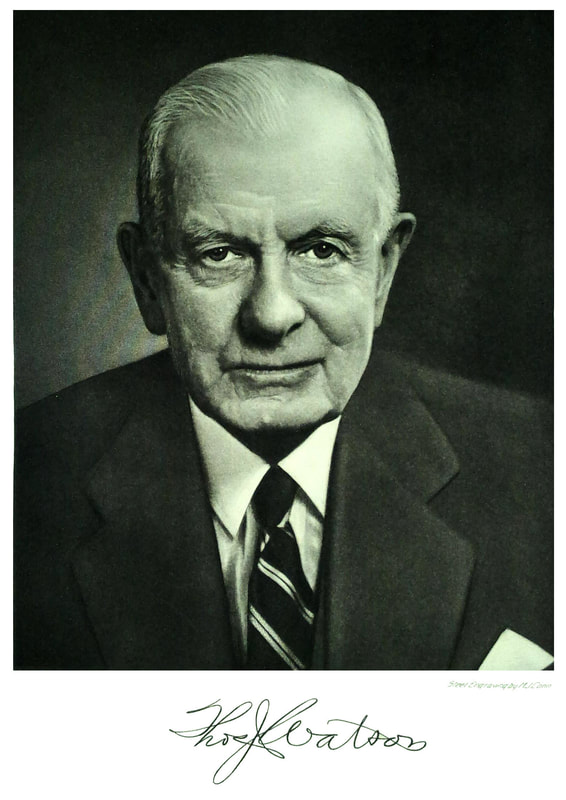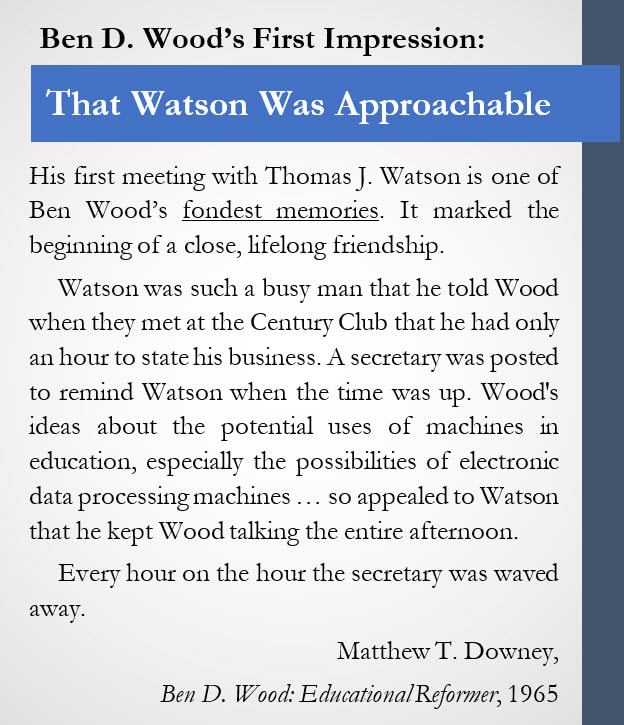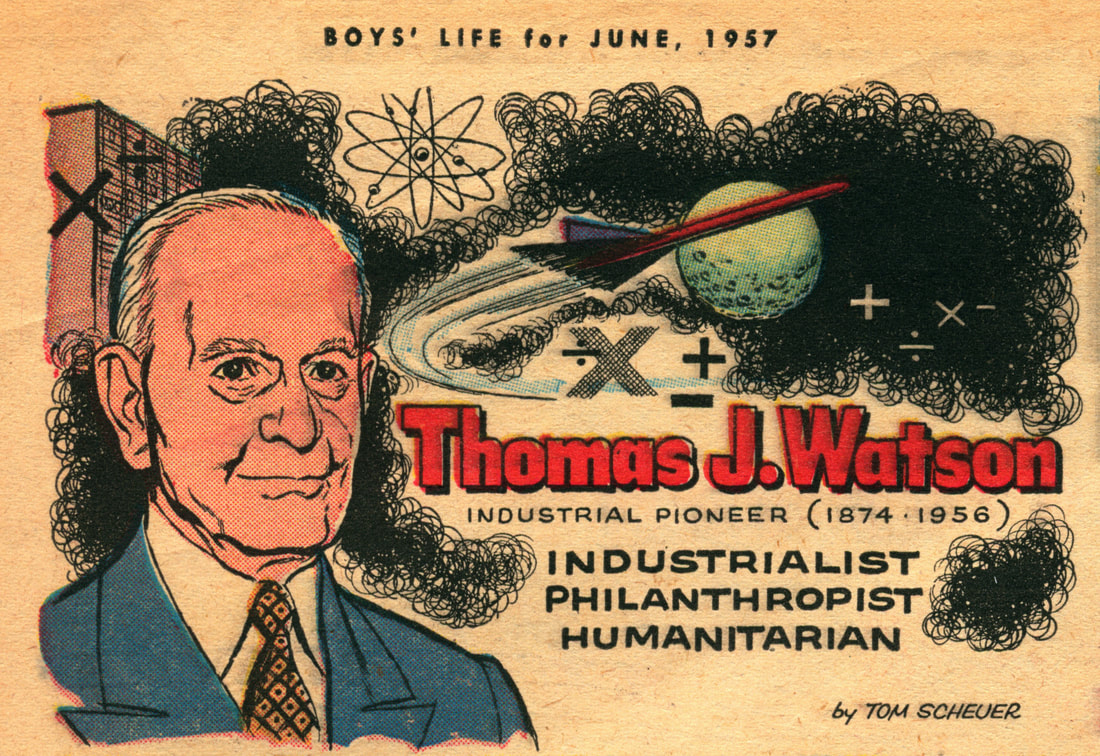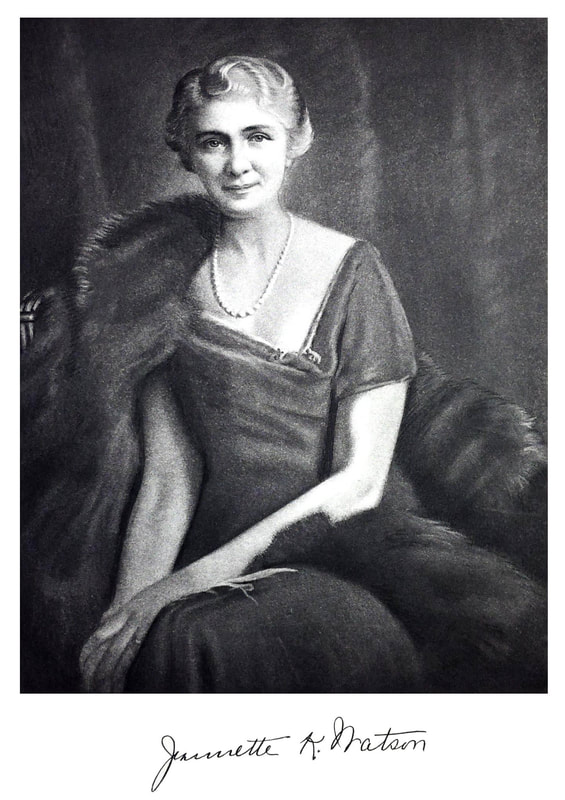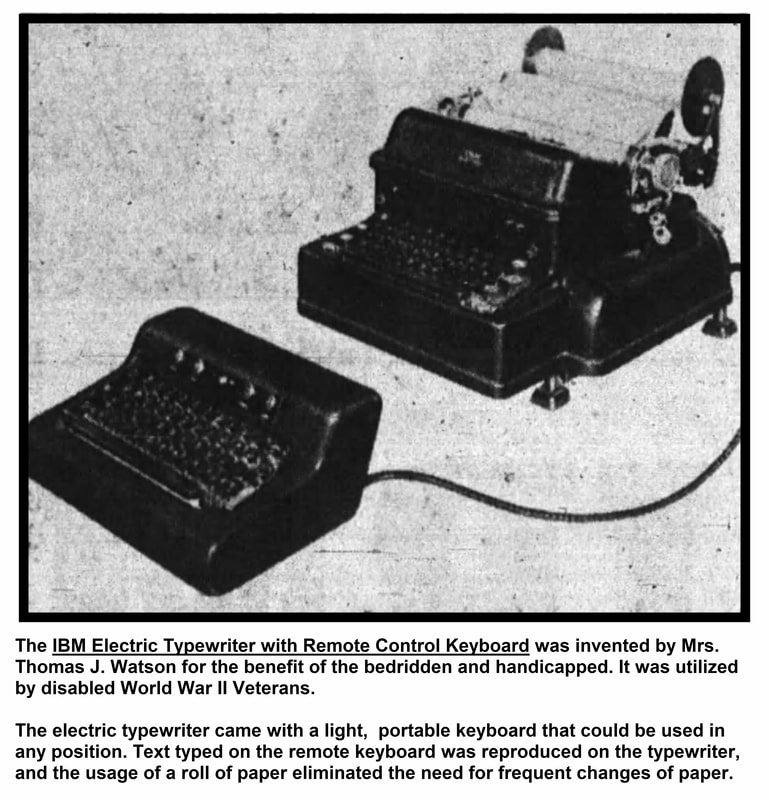The Forgotten Stories of Thomas J. Watson Sr.
- Some Stories about Watson Sr. Are Very, Very Eloquent . . . but Silly
- The Story of Watson's "Democracy in Business"
- The Story of Why Watson Sr. Wanted Blue Suits, White Shirts and Ties
- Links to Many of the Forgotten Stories About Tom Watson Sr.
Some Stories about Watson Sr. Are Very, Very Eloquent . . . but Silly
|
Thomas J. Watson Sr., the traditional founder of IBM in 1914, has been the subject of many books. William Rodgers in THINK wrote the following:
To Watson, men yielded up their right to be different, to question the system that embraced them, engulfed them, rounded off the outlines of their diversity until they became nearly identical reflections in a corporate mirror. This passage makes Watson Sr. sound like a socialist!
Eloquent, but so very, very silly. |
The Story of Watson's "Democracy in Business"
|
Most any IBMer of any generation would read what Mr. Rodgers wrote in his book THINK about Tom Watson and disagree. What appeared alike on the outside in a blue suit, white shirt and tie was still very unique and individual on the inside.
Such is the nature of a corporation comprised of independent thinking men and women that believed "asking forgiveness is easier than asking permission." The word THINK is one of the most decentralizing and empowering words in the English language and Watson Sr. usually followed it with the word ACT. He did not tell people what to THINK unless it was in conflict with some of his most valued and deeply held beliefs such as "Democracy in Business," "We Are All Assistants" or "We Forgive Thoughtful Mistakes." But if you did not agree with these values, he just told you that IBM was not a place for you. This is what Watson told a class of young IBM salesman in 1929. |
Why do some authors paint Tom Watson as aloof and unapproachable? My research indicates otherwise.
|
The businesses today that follow along the lines of democracy are moving faster and making greater progress than the ones in which some men still say, “Well I have had better educational advantages than that man,” or, “I have had better home surroundings than he has had; I am in a little different class and I am not going to associate with him.”
There is no place for such men or such thoughts in The IBM organization.
You all look alike to us.
Thomas J. Watson Sr., "Democracy in Business"
|
The International Boy Scout organization knew Tom Watson as more than an industrialist. He was also a philanthropist and humanitarian.
|
This was the "alikeness" that he wanted in his employees when they looked in their IBM corporate mirror. He commented in 1932, "I am not telling you what to think about. We do not include it in our motto." No he did not; he just asked the elitists and bigots to work somewhere else. They should find a place where elitism and prejudice were allowed, and respect for the individual, service to the customer, or the pursuit of excellence were not expected. As a leader that was his right—and his duty— to enforce.
William Rodgers got it wrong. Watson Sr. knew what he wanted. He knew what he needed. He carried the ultimate responsibility for the success or failure of his corporation; and the employment of thousands depended on his decisions. He knew that a corporation comprised of thousands of employees with crushed spirits could not last forever. |
So he created the world's first corporate employee-owners—our reflection on the outside was conservative but on the inside we were Watsons' Wild Ducks.
The Story of Why Watson Sr. Wanted Blue Suits, White Shirts and Ties
Probably the best description of why Watson Sr. asked all of his employees to dress impeccably was presented in this statement given in eulogy at his death:
The truth came to him simply—he believed clothes don’t make the man but they assist the gentleman.
Rev. Dr. Paul Austin Wolfe, Brick Presbyterian Church minister
These are stories to help balance a person's perspective on the man, Thomas J. Watson Sr. and his wife. It would be hard to separate the two. They were a supreme balancing act, and his wife was constantly at his side.
A Few Perspectives on Mrs. Jeanette Kittredge Watson (Mrs. Thomas J. Watson Sr.)
|
Mrs. Jeanette Kittredge Watson (Mrs. Thomas J. Watson Sr.) was known as "The First Lady of IBM."
|
The following was spoken of her by Father Toomey at a tribute dinner in her honor as covered in The Binghamton Press on April 10, 1948.
“Affectionate, amiable and thoroughly personable, Mrs. Watson possesses the finest and most admirable traits of womanhood.
"Her sympathetic understanding, and solicitude for the welfare of others is symbolic of her truly generous nature. … Her heart is a purse from which many receive the fine gold coins of kindness. …
|
|
“For more than 30 years Mrs. Watson has shared the deep interest of her husband in his business life and has stood strong at his side. Inspiring, modest, neighborly and unpretentious, hers is a life that affords a shining example worthy of emulation. Truly a genuine fine lady.”
Mrs. Watson was the person who, after World War II, suggested that the corporation consider attaching a remote control keyboard to the IBM Electric Typewriter so that the physically handicapped veterans coming back from war would have a means of communication and a possible livelihood [see image].
Cheers,
|
- Peter E.
The Forgotten Stories of Thomas J. Watson Sr.
The links below are provided as a convenience to browse samples of information available on Thomas J. Watson Sr. There are many, many more informative webpages on this site about IBM's traditional founder. Enjoy the information. Even after more than a decade, it still feels like we are just getting started.
- Quotes By and About Thomas J. Watson Sr.
|
They expressed their aspirations and beliefs in eloquent, concise, blunt prose – usually with the prerequisite twist.
|
His peers and friends recognized him not only as a businessman but as a great humanitarian and philanthropist.
|
- Articles By and About Thomas J. Watson Sr.
- Stories of Tom Watson and IBM: Pre, During, and Post World War II
|
- Slice of Life Stories that Reveal the Heart and Soul of Tom Watson Sr.
In April 1930, Tom Watson took over as president of the Genesee Society and "The World's Greatest Salesman" went to work. He wanted this great industrialist to receive the public recognition of his peers that he so richly deserved. Little did everyone know that they were really saying "goodbye."
This is just one of many slice-of-life stories about Tom Watson. |

